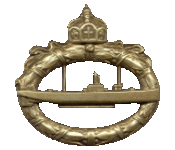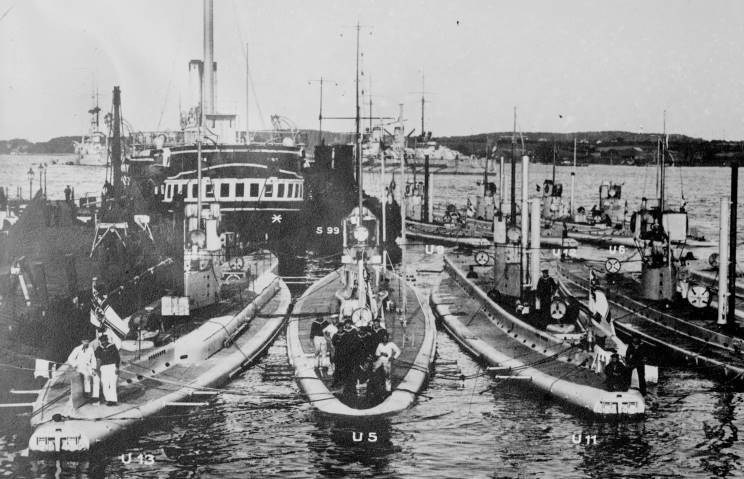|
As July turned into August in the year 1914 the world was on the brink of total war. Following the assassination of Archduke Franz Ferdinand on June 28th by the Black Hand, events in July began to move toward the inevitable On July 28th the Austro-Hungarian Empire declared war on Serbia and the Great War began. Russia began to assemble troops against Austro-Hungary and on Aug. 1st Germany declared war on Russia. The following day Germany invaded Luxembourg. One day later, Aug. 3rd, Germany declared war on France. Events moved fast, on the 4th Germany invaded Belgium, which had denied Germany movement through their country. Until this time Britain had not made its intentions known, but because she had a treaty with Belgium the decision to go to war was made that evening. Only 96 hours after Germany declared war on Russia, two countries had been invaded, and Britain was now plunged into war. There was no immediate threat to Germany from British troops, however the Royal Navy was a threat. So on August 6 ten U-boats sailed from Heligoland to seek out the Grand Fleet in the North Sea. This was the first time ever that a flotilla of submarines wound sortie against an enemy. Included in the first group were two soon to be infamous submarine commanders. Otto Weddigen in U-9 and Walther Schwieger in U-14. Weddigen, who would later sink HM cruisers Hogue, Cressy, Aboukir and Hawke (the first three in one attack) failed to complete his patrol due to an engine failure. Schwieger, the destroyer of the Lusitania, completed his patrol, but failed to find a target. Neither man wound survive the war. Of the remaining boats, U-15 was sunk by HMS Birmingham (Capt. Arthur A. M. Duff, R.N.) on the 9th (the first submarine sunk in the Great War.) Six of the other boats returned to their base with no combat victories among them. This left only one boat remaining, U-13. Under the command of Kapitänleutnant Hans Artur Graf von Schweinitz und Krain, U-13 found no targets and turned home. On Aug. 12, 1914 she send a radio signal saying they were north of Heligoland, that was the last time she was ever heard from. The boat never made port and thus became the first boat "missing for unknown reasons" in the Great War. Over 100 years later, to the best of my knowledge, the wreck has not been found and the real cause of her loss is known only to the 25 men who were lost in her. |
© 2017 Michael W. Pocock MaritimeQuest.com |
Gedenktafel |
 |
In Erinnerung an die gefallenen Besatzungsmitglieder der SMS U-13 |
Name |
Rank/Rate |
Notes |
|
Ahlers, Paul |
U-Maschinistenmaat |
||
Bendfeld, Johannes |
U-Oberheizer |
||
Cybertowitz, Anton |
U-Matrose |
||
Dackweiler, Wilhelm |
U-Maschinistenanwerter |
||
Finder, Wilhelm |
U-Obermatrose |
||
Frank, Paul |
U-Obermaschinist |
||
Fuhrmann, Paul |
U-Heizer |
||
Götze, August |
U-Heizer |
||
Grochowsky, Paul |
U-Heizer |
||
Hohn, Albert |
U-Matrose |
||
Hühne, Wilhelm |
U-F.T.Obergast |
||
Jacob, Gustav |
U-Obermaschinistenmaat |
||
Kruziel, Urban |
U-Obermaschinisten Anw |
||
Lodemann, Kurt |
Leutnant zur See |
||
Losensky, Karl |
U-Obersteuermann |
||
Nünchert, Paul |
U-Bootsmannsmaat |
||
Schmidt, Gustav |
U-Matrose |
||
Schmiedel, Adolf |
U-Bootsmannsmaat |
||
Schnauer, Ernst |
U-Obermaschinistenmaat |
||
Schweinitz und Krain, Hans A. |
Kapitänleutnant |
Commanding Officer |
|
Söhl, Peter |
U-Maschinistenmaat |
||
Speitel, Oskar |
U-Maschinisten Anw |
||
Thomas, Wilhelm |
U-Maschinistenmaat |
||
Wipper, Karl |
Marine Ingenieur |
||
Wolinsky, Friedrich |
U-Obermaschinistenanw |
To submit a photo, biographical information or correction please email the webmaster. |
 |
SMS U-13 (left) along with U-5, U-11. Weddigen's boat, U-9, is seen forward of U-11. |